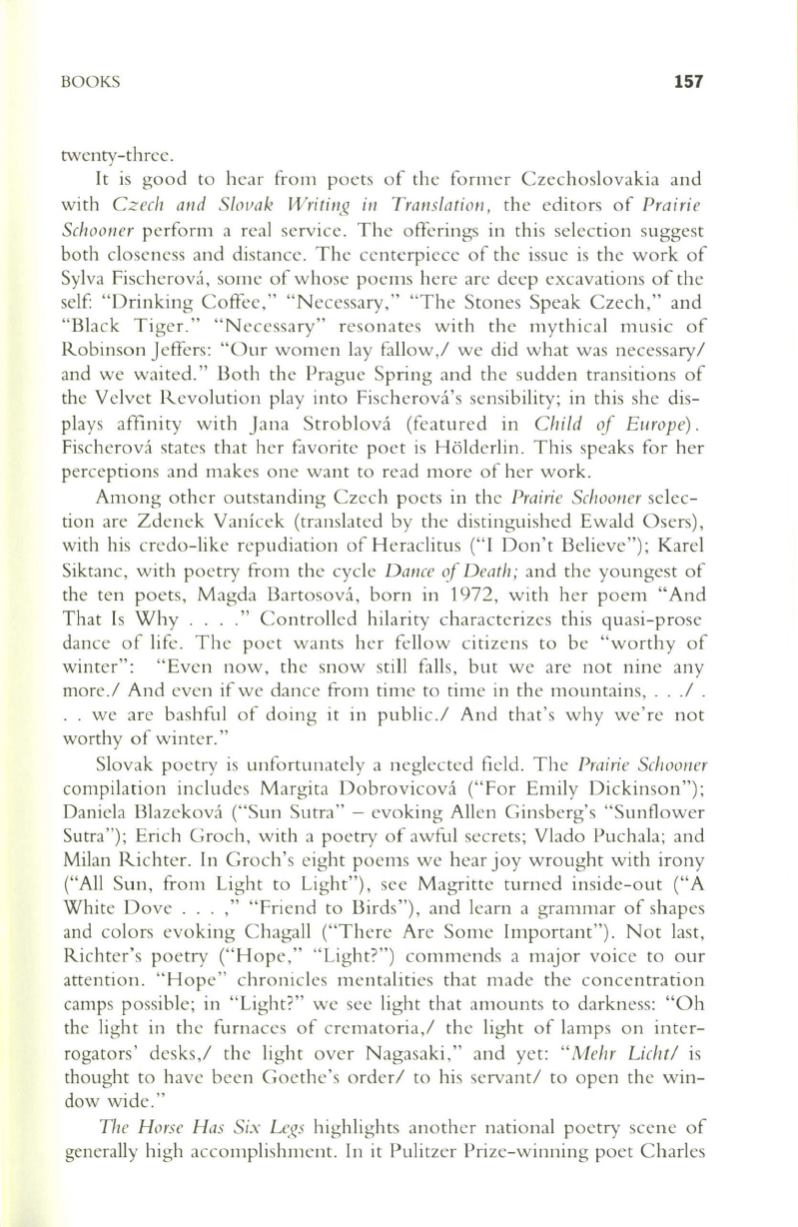
BOOKS
157
twenty-three.
It is good to hear from poets of the former Czechoslovakia and
with
Czech arid Slollak Writing ill Trar15lation,
the editors of
Prairie
Schooner
perform a real service. The offerings in this selection suggest
both closeness and distance. The centerpiece of the issue is the work of
Sylva Fischerova, some of whose poems here are deep excavations of the
self: "Drinking Coffee," "Necessary," "The Stones Speak Czech," and
"Black Tiger." "Necessary" resonates with the mythical music of
Robinson Jeffers: "Our women lay fallow,! we did what was necessary/
and we waited." Both the Prague Spring and the sudden transitions of
the Velvet Revolution play into Fischerova's sensibility; in this she dis–
plays affinity with Jana Stroblova (featured in
Child oj Europe).
Fischerova states that her favorite poet is H6lderlin. This speaks for her
perceptions and makes one want to read more of her work.
Among other outstanding Czech poets in the
Prairie Schooner
selec–
tion are Zdenek Vanicek (translated by the distinguished Ewald Osers),
with his credo-like repudiation of Heraclitus ("I Don't Believe"); Karel
Siktanc, with poetry from the cycle
Dance oj Death;
and the youngest of
the ten poets, Magda Bartosova, born in 1972, with her poem "And
That Is Why .... " Controlled hilarity characterizes this quasi-prose
dance of life. The poet wants her fellow citizens to be "worthy of
winter": "Even now, the snow still falls, but we are not nine any
more.! And even if we dance from time to time in the mountains, .. .! .
. . we are bashful of doing it in public./ And that's why we're not
worthy of winter."
Slovak poetry is unfortunately a neglected field. The
Prairie Schooner
compilation includes Margita Dobrovicova ("For Emily Dickinson");
Daniela Blazekova ("Sun Sutra" - evoking Allen Ginsberg's "Sunflower
Sutra"); Erich Groch, with a poetry of awful secrets; Vlado Puchala; and
Milan Richter.
In
Groch's eight poems we hear joy wrought with irony
("All Sun, from Light to Light"), see Magritte turned inside-out ("A
White Dove ... ," "Friend to Birds"), and learn a grammar of shapes
and colors evoking Chagall ("There Are Some Important"). Not last,
Richter's poetry ("Hope," "Light?") commends a major voice to our
attention. "Hope" chronicles mentalities that made the concentration
camps possible; in "Light?" we see light that amounts to darkness: "Oh
the light in the furnaces of crematoria,! the light of lamps on inter–
rogators' desks,! the light over Nagasaki," and yet:
"Mehr Licht/
is
thought to have been Goethe's order/ to his servant/ to open the win–
dow wide."
The Horse Has Six Legs
highlights another national poetry scene of
generally high accomplishment.
In
it Pulitzer Prize-winning poet Charles


